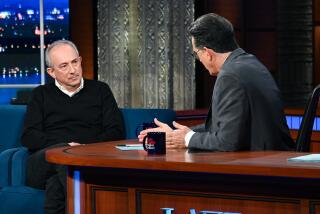Author of ‘Colors’ Is No Mystery
- Share via
NEW YORK — Ending a mystery but opening a new set of questions that roiled the worlds of publishing and journalism, Joe Klein, the Newsweek political writer and CBS commentator, confessed Wednesday that he was the anonymous author of the best-selling novel “Primary Colors” and that he had publicly lied about it.
“There were times when I’ve had to lie to protect a source, and I put this in that category,” Klein said at a Manhattan news conference in which he admitted having written the book.
“My source in this case was this project,” Klein said. Keeping the authorship of the novel secret--leading to weeks of speculation in newspapers, magazines and on television--was a major part of the marketing hype that helped make “Primary Colors” a runaway bestseller--with 1.1 million copies now in print, a paperback edition in the works and an estimated $6 million already in Klein’s bank account.
Klein’s publishers at Random House called the news conference after the Washington Post uncovered a manuscript of the book that included margin notations in Klein’s handwriting.
At CBS, executives debated whether Klein should be fired or censured for having lied on camera when asked if he was the author. No decision would be made until next week at the earliest, network sources said.
At Newsweek, Klein’s open defense of lying in pursuit of profit brought expressions of outrage from some of his colleagues, to whom he had repeatedly denied having written the novel.
The magazine’s embarrassment was deepened by Klein’s revelation that he had told Newsweek editor Maynard Parker in advance that he was the writer. Parker subsequently allowed the magazine to print items speculating about the “mystery” of the book’s authorship.
“Our credibility is all we’ve got,” said one Newsweek writer. “This cheapens the whole currency.”
Even director Mike Nichols, who paid $1.5 million of his own money for the rights to film “Primary Colors”--and who defended Klein after talking to him Wednesday--said he understood the complaints of Klein’s journalistic colleagues.
“Credibility, as my wife [broadcast journalist Diane Sawyer] points out, is the coin in which journalists deal everyday,” Nichols said.
“I just hope that this development doesn’t decrease people’s appreciation for the value of the book,” he said.
Actually, given how much the culture of celebrity has affected American journalism, the reverse could well be true. All the attention Klein is receiving could in the end make him a bigger celebrity both for Newsweek and CBS, noted one CBS executive. After several months in which the initial wave of publicity about the book had died down, Klein--and the book--were back in the news in a big way. He appeared Wednesday evening on CNN’s “Larry King Live,” and CBS booked him to discuss the controversy on its newsmagazine, “48 Hours.”
Random House certainly was not unhappy at all the publicity. Now that he has surfaced, Klein can ride the talk-show circuit to promote the paperback, due in September.
Others, however, are less pleased.
One national political reporter--a longtime friend of Klein--recalled a day this past winter when Klein and other journalists were in Iowa to cover that state’s Republican caucus when Klein, unsolicited, walked up to a group of reporters and began to complain, loudly, that a character in the book was clearly modeled after him and was an unflattering likeness. The book’s anonymous author had treated him unfairly, he complained.
In retrospect, the incident was “a preemptive lie,” the reporter said.
At CBS, Jonathan Klein, the executive vice president of CBS News, who is not related to Joe Klein, said “we are obviously disturbed by the fact that Joe Klein was not forthcoming with us--nor with anyone else--about his authorship of the novel.”
“We are considering what courses of action are open to us,” he said.
In an interview on the “CBS Evening News” several months ago, after a computer analysis by a literature professor had pointed the finger at him, Klein flatly denied being the author. “Now I know what it’s like to be the flavor of the week,” he told CBS correspondent Martha Teichner. “It’s not me. I didn’t do it.”
Klein said Wednesday that lying on camera “was one of the most difficult things I ever had to do.”
Some media executives defended Klein. At CBS, one executive noted that Klein had never misrepresented himself in his official capacity as a political commentator.
At Newsweek, Parker said anonymity “is an old literary tradition dating back to Shakespeare. Joe did the right thing. He told me.
“He wrote a novel as ‘Anonymous.’ It is not an issue of national security. It is ‘Who Shot J.R.?’ ”
But among Newsweek staffers, there was intense debate.
“This is a tough one,” said Jonathan Alter, the magazine’s media critic. “It has certainly registered very high on the Richter scale over here.”
In his CNN interview, Klein defended having lied about being the author, saying he had “a commitment to Random House” to keep the authorship of the novel a secret. But at the news conference, Harold Evans, Random House’s president and publisher, indicated that the desire for secrecy had come from Klein.
“The author did not want to be identified in any way,” Evans said. Klein said he anticipated his confession of authorship would be greeted by controversy.
“I am in the midst of the world’s greatest tornado for the day,” he said.
Evans saw things a bit differently. A reporter suggested to the publisher that the whole affair had a rather “delicious” Barnum and Bailey flavor.
“There was evidence of that,” Evans admitted.
Times staff writers Elaine Dutka and Edwin Chen contributed to this story.
More to Read
Sign up for our Book Club newsletter
Get the latest news, events and more from the Los Angeles Times Book Club, and help us get L.A. reading and talking.
You may occasionally receive promotional content from the Los Angeles Times.










